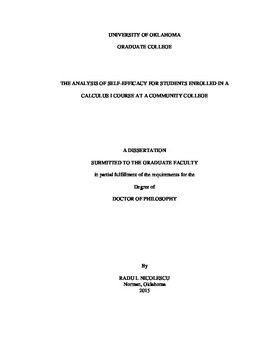| dc.description.abstract | It is generally accepted that learning implies a multitude of factors meant to prepare the children for life and its challenges. Some of these factors are directly related to the level of knowledge of subject matter, but others are based on individual feelings, relationships, or capabilities of developing a sense of belonging and personal worth, confidence, or attitude toward a certain content area. All these elements together form the foundation of student’s future success. On many occasions, certain factors such as the teaching approaches, encouragement from family members and school personnel, or past experiences in learning mathematics are important in creating a positive view of mathematics. From basic arithmetic to the more advanced calculus courses in first years of college, students build knowledge and shape continuously their views on mathematics. These factors and experiences can help form the foundations of a positive attitude toward mathematics and may influence students’ self-efficacy with respect to the mathematics.
While literature provides examples where students’ self-efficacy was a determining factor in pursuing and solving mathematics problems, the influence of college mathematics courses on developing higher or lower levels of self-efficacy was a scarcely explored area. The purpose of the current study was to identify the impact of a Calculus and Analytic Geometry I course on college freshman students’ mathematics self-efficacy, and suggest ways of using the results for future teaching and learning. The study used an explanatory sequential mixed methods research design, where the quantitative portion of the study helped determine participants for qualitative portion of the study.
The results revealed that the Calculus and Analytic Geometry I course improved general students’ self-efficacy in some areas of mathematics related to daily mathematical tasks. Also, it was determined that students’ background in previous mathematics courses had a strong impact in maintaining a high level of self-efficacy, and class interaction had a particular role in increasing most students’ self-efficacy. The majority of students reported that interactivity in mathematics classes in high school was less evident than the interactivity observed in these college mathematics classes. Not surprisingly, some students reported a preference to follow algorithms and step-by-step methods when solving mathematics problems rather than rely on deeper understanding.
Although the results of the study cannot be generalized, it was suggested that instructors should insist on constructing a strong mathematical background of students early in students’ mathematics classes. While peer work and collaboration should be encouraged, the instructor should also identify those students who prefer different approaches in studying mathematics. The same observation about teaching and learning approaches is valid in the case of using algorithms and step-by-step problem solving methods.
Keywords: self-efficacy, interactivity, mathematical background, algorithm | en_US |
